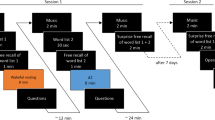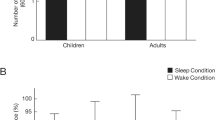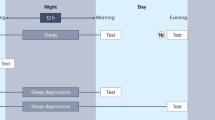Summary
Question of the study
In the current literature it is still matter of discussion in which ways sleep might be beneficial for memory consolidation/enhancement. Former studies successfully demonstrated that sleep after learning produces greater (procedural/implicit) memory enhancements than equal amounts of waking. As far as naps are concerned, only few studies have been published on this issue; with respect to the influence of naps on declarative/explicit memory performance, there is even a complete lack of empirical data.
Subjects and methods
To find out whether 60-min naps (time in bed) might have a positive effect on declarative memory performance, we tested 22 subjects aged between 19 and 30 years. Subjects were trained on a declarative word-pair association task (prior to sleep) and were tested (cued recall) before and after 1 h of midday napping.
Results
Overall performance was significantly greater after sleep than before the nap. The data indicated that only those participants entering slow wave sleep (M=18.23 min) during the nap showed memory enhancement thereafter. Furthermore, quantitative EEG analyses revealed strong positive associations of (occipital) theta activity during the nap with memory performance enhancement.
Conclusions
In conclusion, the present findings support the sleep-dependent memory consolidation hypothesis and extend its scope to declarative learning in short midday naps.
Zusammenfassung
Fragestellung
In der aktuellen Literatur wird nach wie vor diskutiert, ob und auf welche Art und Weise Gedächtniskonsolidierung bzw. Gedächtnisverbesserung von Schlaf profitiert. Vorangegangene experimentelle Befunde stützen die Hypothese, dass Schlaf-im Vergleich zu äquivalenten Wachphasen-unmittelbar nach dem Lernen die (prozedural/implizite) Gedächtnisleistung stärker verbessert. Zum Thema Mittagschlaf und Gedächtniskonsolidierung existieren kaum (publizierte) Studien, wobei empirische Daten zu deklarativ-explizitem Gedächtnis praktisch gänzlich fehlen.
Probanden und Methodik
Um zu untersuchen, ob ein 60-minütiges (Bettzeit) Nickerchen einen positiven Einfluß auf die deklarative Gedächtnisleistung hat, wurden 22 Versuchspersonen (Alter: 19–30 Jahre) getestet. Die Versuchspersonen trainierten vor dem Nickerchen eine deklarative Wortpaar-Assoziationsaufgabe und wurden jeweils unmittelbar nach dem Lernen bzw. nach einem einstündigen Nickerchen getestet (“cued recall”).
Ergebnisse
Insgesamt hatten die Versuchspersonen nach dem Nickerchen eine signifikant bessere Gedächtnisleistung. Es zeigte sich weiter, dass sich nur die Gedächtnisleistung jener Versuchspersonen verbesserte, deren Nickerchen auch Tiefschlaf (M=18,23 min) beinhaltete. Eine quantitative Analyse des Schlaf-EEGs zeigte zudem einen stark positiven Zusammenhang zwischen okzipitaler Theta-Aktivität und verbesserter Gedächtnisleistung.
Schlussfolgerungen
Die präsentierten Ergebnisse stützen die “schlafabhängige Gedächtniskonsolidierungshypothese” und erweitern diese um deklaratives Lernen während des Mittagschlafes.
Similar content being viewed by others
References
Anderer P, Gruber G, Klösch G, Klimesch W, Saletu B, Zeitlhofer J: Sleep and memory consolidation: the role of electrophysiological neuroimaging. Somnology 6: 54–62, 2002.
Dinges DF, Broughton, RJ: Sleep and alertness: chronobiological, behavioral, and medical aspects of napping. Raven Press, New York, 1989.
Ficca G, Salzarulo P: What in sleep is for memory, Sleep Med 5: 225–230, 2004.
Gais S, Mölle M, Helms K, Born J: Learning-dependent increases in sleep spindle density. J Neurosci 22(15): 6830–6834, 2002.
Gottselig JM, Hofer-Tinguely G, Borbély AA, Regel SJ, Landolt HP, Retey JV, Achermann P: Sleep and rest facilitate auditory learning. Neuroscience 127: 557–561, 2004.
Hayashi M, Watanabe M, Hori T: The effect of a 20 min nap in the mid-afternoon on mood, performance and EEG activity. Clin Neurophysiol 110: 272–279, 1999.
Hoddes E, Dement WC, Zarcone V: The development and use of the Stanford Sleepiness Scale (SSS). Psychophysiology 10: 431–436, 1973.
Home JA, Oestberg O: A self-assessment questionnaire to determine momingness-eveningness in human circadian rhythms, Int J Chronobiol 4: 97–110, 1976.
Huber R, Ghilardi MF, Massimini M, Tononi G: Local sleep and learning. Nature 430: 78–81, 2004.
Johns MW: A new method for measuring daytime sleepiness: the Epworth sleepiness scale. Sleep 14(6): 540–545, 1991.
Kattler H, Dijk DJ, Borbély AA Effect of unilateral somatosensory stimulation prior to sleep on the sleep EEG in humans. J Sleep Res 3(3): 159–164, 1994.
Klimesch W: EEG alpha and theta oscillations reflect cognitive and memory performance: a review and analysis, Brain Res Reviews 29: 169–195, 1999.
Maquet P: The role of sleep in learning and memory. Science 294: 1048–1051, 2001.
Maquet P, Smith C, Stickgold R: Sleep and brain plasticity. Oxford University Press, New York, 2003.
Mazzoni G, Gori S, Formicola G, Gneri C, Massetani R, Murri L, Salzarulo P: Word recall correlates with sleep cycles in elderly subjects. J Sleep Res 8: 185–188, 1999.
Mednick SC, Nakayama K, Cantero JL, Atienza M, Levin AA, Pathak N, Stickgold R: The restorative effect of naps on perceptual deterioration. Nature Neurosci 5(7): 677–681, 2002.
Mednick S, Nakayama K, Stickgold R: Sleep-dependent learning: a nap is as good as a night. Nature Neurosci 6(7): 697–698, 2003.
Meier-Koll A, Bussmann B, Schmidt C, Neuschwander D: Walking through a maze alters the architecture of sleep. Percept Mot Skills 88: 1141–1159, 1999.
Ott H, Oswald I, Fichte K, Sastre-Y-Hernandez M: Visuelle Analogskalen zur Erfassung von Schlafqualität. In: Collegium Internationale Psychiatriae Scalarum (CIPS): Internationale Skalen für Psychiatrie, 4. Auflage, Beltz, Göttingen, 1996.
Peigneux P, Laureys S, Fuchs S, Collette F, Perrin F, Reggers J, Phillips C, Degueldre C, Del Fiore G, Aerts J, Luxen A, Maquet P: Are spatial memories strengthened in the human hippocampus during slow wave sleep? Neuron 44: 535–545, 2004.
Peigneux P, Laureys S, Fuchs S, Destebecqz A, Collette F, Delbeuck X, Phillips C, Aerts J, Del Fiore G, Degueldre C, Luxen A, Cleeremans A, Maquet P: Learned material content and acquisition level modulate cerebral reactiviation during posttraining rapid-eye-movements sleep. Neuroimage 20: 125–134, 2003.
Plihal W, Born J: Effects of early and late nocturnal sleep on declarative and procedural memory. J Cogn Neurosci 9(4): 534–547, 1997.
Saletu B, Wessely P, Grünberger J, Schultes M: Erste klinische Erfahrungen mit einem neuen schlafanstoßenden Benzodiazepin, Cinolazepam, mittels eines Selbstbeurteilungsbogens für Schlaf- und Aufwachqualität (SSA), Neuropsychiatrie 1(4): 169–176, 1987.
Schabus M, Gruber G, Parapatics S, Sauter C, Klösch G, Anderer P, Klimesch W, Saletu B, Zeithofer J: Sleep spindles and their significance for declarative memory consolidation. Sleep 27(8): 1479–1485, 2004.
Stickgold R, Whidbee D, Schirmer B, Patel V, Hobson JA: Visual discrimination task improvement: a multi-step process occurring during sleep. J Cogn Neurosci 12: 246–254, 2000.
Takahashi M, Arito H: Maintenance of alertness and performance by a brief nap after lunch under prior sleep deficit. Sleep 23(6): 813–819, 2000.
Walker PM: A refined model of sleep and the time course of memory formation. Behav. Brain Sci, forthcoming.
Walker PM, Brakefield T, Morgan A, Hobson JA, Stickgold R: Practice with sleep makes perfect: sleep-dependent motor skill learning. Neuron 35: 205–211, 2002.
Zung WWK: A self-rating depression scale. Arch Gen Psychiatry 12: 63–70, 1965.
Zung WWK: A rating instrument for anxiety disorders. Psychosomatics 12: 371–379, 1971.
Author information
Authors and Affiliations
Corresponding author
Rights and permissions
About this article
Cite this article
Schabus, M., Hödlmoser, K., Pecherstorfer, T. et al. Influence of midday naps on declarative memory performance and motivation. Somnologie 9, 148–153 (2005). https://doi.org/10.1111/j.1439-054X.2005.00054.x
Received:
Accepted:
Issue Date:
DOI: https://doi.org/10.1111/j.1439-054X.2005.00054.x




